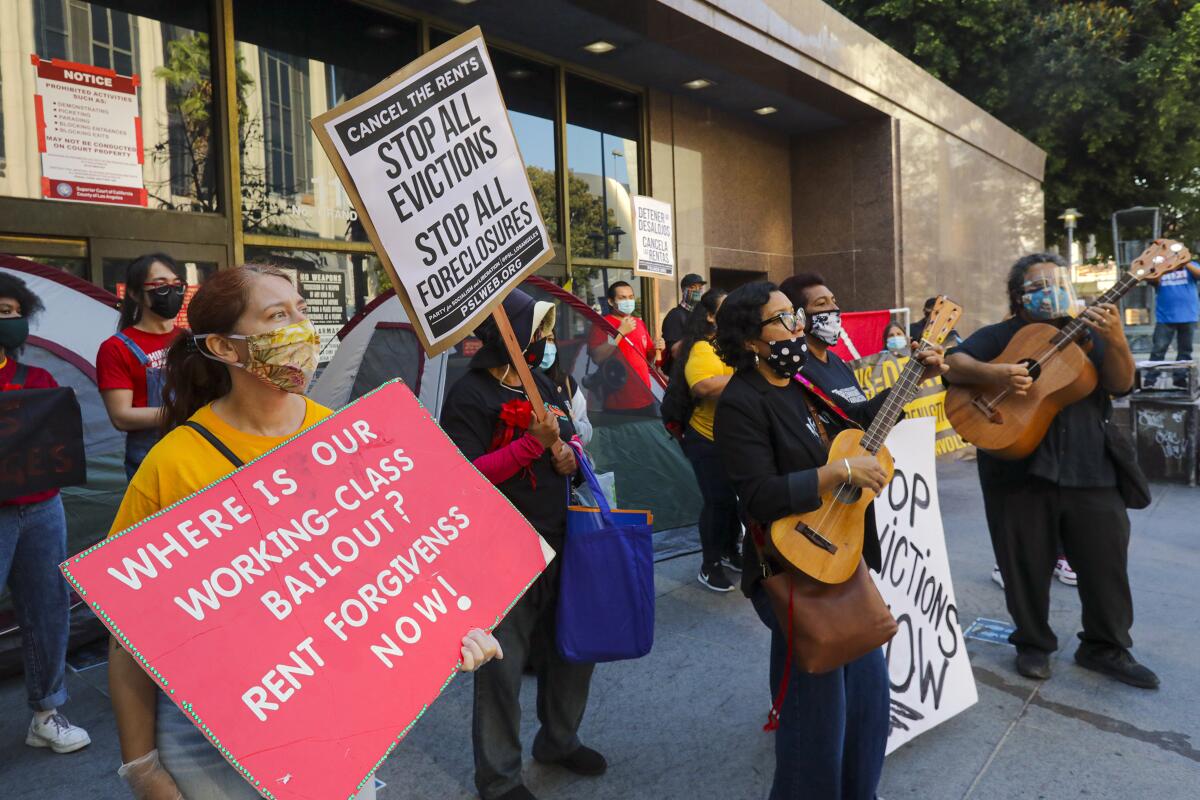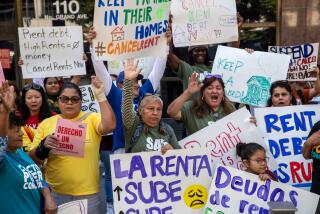Editorial: Trump’s eviction ban will keep the deluge of misery at bay. For now

The Trump administration gave struggling renters a major reprieve this week by declaring a national moratorium on evictions, ensuring that many tenants who’ve lost income and can’t pay the rent won’t be ousted from their homes this year.
The ban on evictions is unprecedented, sweeping and desperately needed. Millions of laid-off Americans have teetered on the edge of financial disaster for months now. Thanks to an extra $600 a week in unemployment benefits, the vast majority of tenants were able to keep making all or much of their rent payments. But those benefits ended in August — largely because Senate Republicans and Trump opposed a House-passed bill to extend them — even though vast numbers of workers are still off the job or on reduced hours.
Many states’ eviction moratoriums have also expired or will do so soon, leaving tenants at the mercy of eviction courts. Trump’s order comes at a critical moment.
The order was issued by the Centers for Disease Control and Prevention, which rightly recognized that we can’t slow the spread of COVID-19 unless people have a home in which to quarantine, isolate and socially distance. It would be counterproductive to controlling the pandemic and, possibly, deadly to let renters be evicted into homelessness.
Unlike the previous patchwork of state and local moratoriums, this new national ban applies to all tenants who meet the broad criteria laid out in the CDC order. Among other requirements, tenants must have incomes no higher than $99,000 per individual or $198,000 per married couple, must have suffered a significant loss of income and must have tried to make rental payments.
The national moratorium sets a baseline of protection for tenants through the end of the year. It doesn’t supersede states and cities that have enacted greater safeguards.
That means California’s new eviction measure still stands. That law, which Gov. Gavin Newsom signed minutes before an existing moratorium expired, bars evictions through Jan. 31. Better yet, as long as tenants pay 25% of the rent owed by that time, they cannot be evicted for being delinquent on the rest even after the new state moratorium expires. Their unpaid rent will become consumer debt, and landlords will have to go to civil court to recoup the money. Tenants who do not pay at least 25% of their rent debt, however, can be evicted for nonpayment after Feb. 1.
It took weeks of hard-fought negotiations between lawmakers, landlords and tenant advocates for California to pass this plan. Meanwhile, the unabashedly pro-business Trump administration imposed the national moratorium with no relief or concessions to landlords. Administration officials said states and cities could choose to use federal relief dollars they received earlier in the year to bail out landlords.
These eviction moratoriums are essential so people don’t lose their homes in a pandemic. But tenants will eventually have to come up with the rent payments they missed. Under Trump’s national moratorium, tenants would be responsible for paying back all they owe, plus late fees and penalties, on Jan. 1. So far, the moratoriums have only delayed, not averted, the looming wave of evictions when the rent debt comes due.
There’s still another problem developing. Eviction moratoriums are forcing some property owners to go without rent payments for nine months or longer. Most landlords are small-business owners. How are they supposed to pay their property taxes or utility bills? How can they pay the employees who manage their properties?
The only real solution at this point is money. The $3-trillion coronavirus relief bill that House Democrats passed in May included a $100-billion emergency rental assistance fund for low-income tenants. That plan could still be the lifeline for struggling tenants and landlords, who have been forced to bear the brunt of the COVID financial crisis.
Trump’s eviction moratorium prevented disaster. He and Congress now need to provide the dollars needed to make sure tenants and landlords can survive the pandemic and its aftermath.
More to Read
A cure for the common opinion
Get thought-provoking perspectives with our weekly newsletter.
You may occasionally receive promotional content from the Los Angeles Times.










